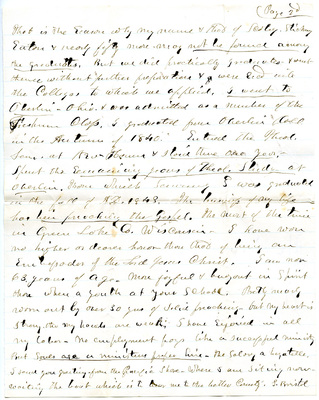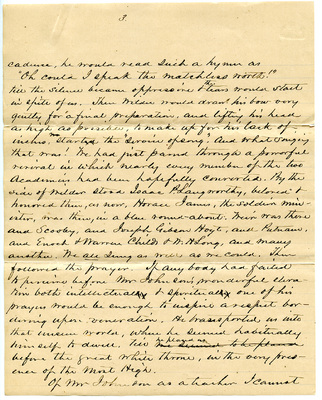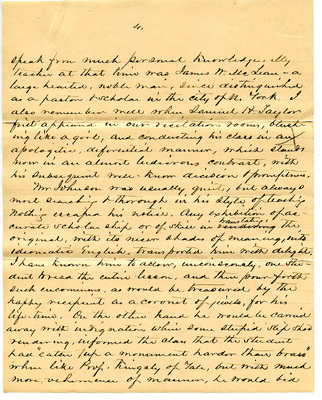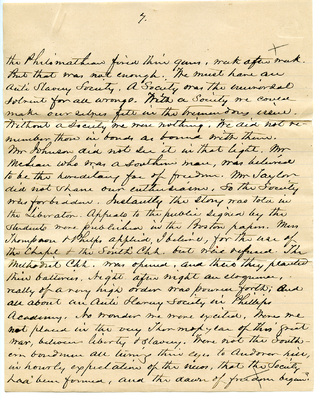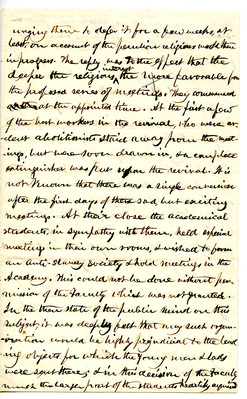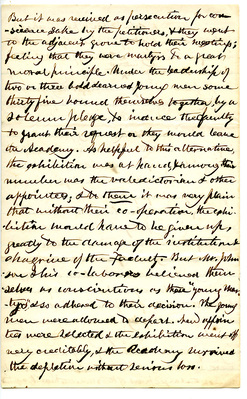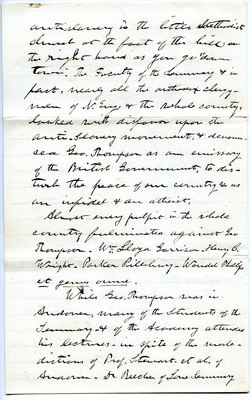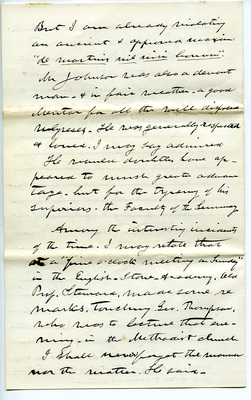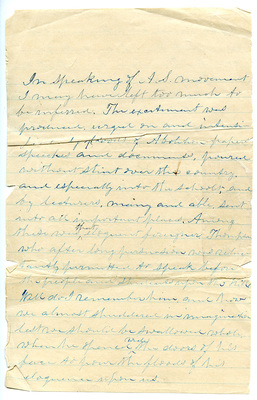Pages That Need Review
Student Anti-Slavery Statement August 5, 1835
2
A STATEMENT
OF THE CIRCUMSTANCES WHICH INDUCED
*FIFTY STUDENTS OF PHILLIPS' ACADEMY, ANDOVER
To ask a Dimission from that Institution
We regret the necessity, which compels us to appear before the public in vindication of our conduct. The course which we have pursued may seem, we are all well persuaded, at the first glance, to many of the great, the wise, and the good, to savor of rashness and fanaticsm. And in the outset, it will naturally be asked, who are these students? What their age and character? Every feeling of our hearts would prompt us on these 'delicate' topics, to maintain an entire silence. But when, by withholding facts on such points, we run the hazard of being held up by unprincipled and designing men, as a 'parcel of insignificant and deluded youngers,' 'Fixed figures for the hand of scorn, To point her slow unmoving finger at,' we are not at liberty to be silent.
A large majority of our number have reached that period, when by the laws and and usages of the land, we can lay claim to all the privileges and immunities of free American citizens. The average age is more than twenty-one. There is but one of us, who, by the laws of this Commonwealth, is not required to pay an annual tax into the public revenue. Nearly all are professors of religion, and studying for the Christian ministry. We do not propose on the present occasion to enter into a labored exposition of Anti-Slavery principles ; neither to heap calumny and disgrace upon the head of any man, or set of men living ; much less to exhibit any thing approximating even in the slightest degree to a spirit of recklessness and bravado. Our simple object is, to spread out before the world the circumstances and the facts in our case. And though in these may be embodied all the unkindness and severity of unwelcome truth, yet justice to ourselves and the world, calls upon us to make them known. Only let our statements be fairly and impartially weighed, and we are willing to abide the decision of an enlightened and christian public. We now proceed to detail that unhappy train of circumstances which has finally resulted in our withdrawal from the Institution.
In the fall of 1834, a committee was appointed by the abolitionists in Phillips' Academy, to wait upon the Principal, Mr. Johnson, for the purpose of obtaining his permission to form an Anti-Slavery Society in said Institution. Their suit was promptly rejected.
In January, 1835, by vote of the Abolitionists in the same Institution, a respectful memorial was drawn up, by a committee appointed for that purpose, asking permission, a second time, from the Principal, to form an Anti-Slavery Society. This petition was not presented, from the fact that our Instructor informed one of the committee, that 'he had made up his mind upon the subject—that he objected to its formation, but if the committee wished to 'instruct him' on the subject, he would wait on them.' We could, of course, proceed no farther with the business, without putting ourselves in the attitude of 'instructors,' which, as modest young men, as pupils, we could not do without outraging all rules of propriety. Thus ended our second effort to form an 'Anti-Slavery Society in Phillips' Academy.' The next inquiry was—Can we join a society in the Theological Seminary, or in the village, in case of its formation? Mark the answer given at this time, and then reconcile it with a law, enacted a short time subsequently, for the purpose of preventing the students from joining the Anti-Slavery Society in the village, which we shall soon introduce. The substance of this answer, was as follows: 'If individuals see fit to connect themselves with either of these societies, I do not prohibit them, though I could give my advice. From what quarter does the breeze next blow? You shall hear. Truth is our panoply, facts are our weapons, and wield them we must, let shame and confusion fall upon whom they may.
On Tuesday evening, February 3, 1835, an 'Anti-Slavery Society' was formed in the Village, and some 25 or 30 of the students of Phillips' Academy entered their names, upon its Constitution—not half the number who would have joined, but for what afterwards transpired. On a subsequent morning our Instructor, learning that his pupils had taken an active part in the meeting above-mentioned, but ignorant that any had actually become members of the Society, in connection with other remarks, gave the following so called 'advice': 'Now having expressed my views on this subject, (the formation of the AntiSlavery Society) do I expect any member of my school will join that Society? No, I do not. And if any individual feels it is his duty to belong to that Society, I expect him as a gentlement and a christian, to come to me and have his name taken from my list. And now, my young friends, don't go about complaining that I am unreasonable. There is no compulsion—you are as free as air— but if you must join an Abolition Society, come to me and I will give you an honorable dismission and recommendation to any Institution in the Union, and no man in my presence shall ever say aught against you.' Comment is unnecessary. On the evening of the same day, our Principal having learnt that some members of his school had joined the Society above-mentioned, gravely tells us, 'That he supposes it will be just as easy for us to take off our names as it was to put them on.' But what is the result? Do we forthwith erase every name, and by this act make an expiratory sacrifice for the heinous crime of thinking and acting according to the dicates of our own consciences, on a subject, freighted with interests as weighty as the salvation, temporal and eteneral, of two and a half millions of our countrymen, together with the extension and purity of the church universal? No. We 'immediately conferred not with flesh and blood,' but looked to God—took courage, and having put our hand to the plough, dared not to look back. Those of us concerned, well remember through what a fiery furnace we were called to pass. All who considered it their duty to continue their membership, were requested to hand in their names to the Principal. Most of them were promptly given. Now in connection with this request, take the so called 'advice' before referred to, and what, we ask, save expulsion, could be supposed to await us? Thus day after day were we kept 'on the tenters.' When we put the question, whether for this high misdemaneous, (?) expulsion must be met ; the response was, 'I shall do nothing rashly,' as ambiguous as the oracles of Apollo. The fear of dismission was thus brought to bear powerfully upon us. And when this method proved entirely futile, the powers of persuasion were put in requisition ; and, in more than one instance, were we addressed in terms like the following: 'Now if all the rest will erase their names, will not you also? Now if you will not do it from principle, will you not out of respect to my feelings?' But all in vain. Conscious that we had planted our feet upon the rock of eternal truth, we stood unmoved. No name was taken off.
And now we ask the candid consideration of our readers to a law enacted a short time subsequent to the above proceedings, but not, however ; till after the famous vote of neutrality was passed in the Theological Seminary. It was couched in the following language, viz: 'No member of Phillips' Academy shall join any society in the town of Andover, without permission from the Principal' ! ! Now, premising that this law was made, not to regulate the conduct of students alone, but to be enforced upon those removed? at the age of manhood, and who of course were entitled to the rights of surfface and the privileges of citizenship, we put the question in enlightened public, and ask them, if they have thus learnt liberty from their veteran for ??? fought the battles of the revolution? ??? to the statesman, and ask him to tell us ??? law is in keeping with our Declaration of Independence and inimitable Constitution. And finally, we ask the ministers of our holy registry, if they have thus learned liberty in the school of Christ? And had we, in consequence of the liability simply to which this enactment exposed every one, immediately dissolved our concern with the Institution sanctioning it, which could have been our accusor? But we did ???- tily. We waited its operation. We consequently persuade ourselves to believe, that ???s and consistent individual of mature years ??? be hindered from joining any Society which in he might feel in duty bound to unite, ??? in such cases we utterly reputate the principle of acting by permission.) But what think ???e our feelings, when we saw a beloved brother of devoted piety, and 25 years of age, wi??? burning with a desire to do something for his poor, degraded, importent, enslaved companion by the administration of this law, prevented from bearing his testimony against a sin, greater than which, none exists on the face of the earth —we mean Slavery. And how did the case be- come aggravated, when another of one ??? of similar character, and 20 years of age, was prevented from giving his name to the Slavery Society in the church to which he ???- ed, composed of his own brethern and of Christ, and having for its president his ??? for? And had we then, at once and forevermore solved our connection with an instiution holding within its bossom a principle like ??? thereby proclaimed to the world our heated indignation against such an unwarrantable ??? of power, who, we triumphiantly ask, who would've dared to stand forth as our accuser? But strange as it may seem, we still forebore, preferring to risk a high charge, on the score of ??? and pusillanimity, than to expose ourselves to unjust imputation of rashness or folly. And ??? sorted to this final step, only when the lingering hope of redress was utterly extinguished and the dark night of despair was settling ??? heavy around our heads. The successive ??? which led to this unhappy result, shall be minutely and honestly detailed.
On July 11, 1835, the Abolitionists in Phillips' Academy, convened for the purpose of forming an Anti-Slavery Society. After choosing a committee to draft a memorial and present to the Principal, it was unanimously
'Resolved, That we regard Anti-Slavery as the cause of God and humanity, and that students should devote themselves to its prom??? that boldness, meekness, and prayer be -come the gospel of Christ ; as no other shall in reality advance the cause, or be a??? to God.'
July 15. The Academy having been informed, a meeting was held under the broad ??? of heaven. At the opening of the meeting, the following resolution was unanimously approved.
'Resolved. That this, and all our following meetings be opened with prayer.'
The following memorial was then read and adopted. It is but proper here to restate that this article was written without any premonition that it would be made public, which ??? as some apology for any inaccuracies ???ge or infelicity of arrangement.
We, whose names are undersigned, are well aware the relations we sustain to yourself, make it our duty to hold you in the highest respect and regard the more so, as we have the fullest evidence that all your feelings and all your conduct toward us, are the result of a tender regard for our welfare and that of the world. And, while such are our impressions, how can we have any other feelings than those of filial love and obedience?—But there are certain occassions, as everyone will admit, when we are not at liberty to do as we would. Even now, if we could act as feeling would suggest, we would throw aside our pen, and forever hold our peace. But when principle is concerned—when we must follow the advice of our superiors, or of our own fathers even, if we do so at all, at the expense of conscience, and our own sense of right and wrong, we cannot, we dare not do it. Otherwise, we should plainly disregard the injunction of wisdom and the bible—'that we ought to obey God rather than men.' ??? the feelings, Sir, with which we make amid request for your permission to form an Anti-Slavery Society in Phillips' Academy. ??? urgent delicacy indeed that we prefer ??? as you have already twice given your ??? a similar one. But we are conscious ??? it not to trifle with your feelings. We ??? higher motive. Something within tells us it is our duty—our right ; that it is Heaven's own boon to us, to think and act on the subject of Slavery as on every other moral subject, ???ing to the dicates of our own consciences ??? that this is as scared—as unalienable as the immortal principle of life itself ; bestowed on us at the beginning by our ??? and beloved Creator, and which none but He who conferred it, or assumes His high prerogrative can take from us. You will, Sir, do well to inquire the reasons which impel us against ???- fer this request, and which leads us to hope ??? is favorable acceptance. They are briefly ???:
Fiurst, Ut sempter,—that we believe slavery to be a sin ; and that the church whose s??? in ???in a great measure, can never prosper, or be prepared to co-operate with the Holy Spirit ???- ing about the glorious purpose of the redeemer, until this shackle is thrown off.
Second, We believe that we individually and collectively have a duty to perform in removal of this sin, and that if we stand aloof and give not our influence against it, we are the ???ers of slaveholders, and are thus doing wrong onto that prerecept of our holy religion, which formally demands, 'Be not partakers of other mens' sin.' And furthermore, we feel it to be our ??? set on this subject, as much on the subject of temperence, or missions, or any of the great ???- tions of religion or morals, which are ???- ing the community. And that while we are subjects we are not permitted either by self, the public, or the word of God, to remain different in thought and action, so we cannot insistentently and righteously, exclude the slave from our sympathies, our prayers, and our efforts.
Third, We feel that the only effectual way to exert our influence, is by a regular, student co-operation, and an open declaration of our abhorrence of the sin. Were the world filled with drunkards, we could not feel our duty done should we merely think them wrong, while we use not our voice to warn them of their sin and ???. Or, were all mankind infidels, and corrupted from God, there would be no neutral path for us. We should feel bound to take a stand, and cry aloud in the ears of the glutton and proclaim that there was a God who ??? long forbore, would yet be the punisher and the avenger of trampled justice.
Fourth, We wish to associate together, that we may the better inform ourselves on this subject, in order to pray and act more intelligently, and by our mutual encouragement, to enlist our sympathies and efforts in behalf of suffering humanity. But permit us, Sir, to state briefly, what our object is not.
It is not,
First, To create a feverish, party excitement. On the contrary, we believe that should you grant our request, it would greatly tend to allay such an excitement. For what can be more likely to effect this, than for every one to think and act for himself? Or what more to create, than a disposition in one party to denounce and crush another?
Second, It is not that we wish to gratify our own self will, or follow the impulse of feeling, in opposition to our better judgement. Such is not the fact. We have been driven to it by a settled and imperious convinction of duty to God, and our fellow men.
Third, It is not that we wish to favor any man, or set of men. The principles of Abolition are what we love, and upon which we feel bound to act.
Fourth, It is not that we may gain popularity— we except rather the public odium. We expect to be branded with the epithets of fanatics, as the dupes of a wild phrenzy, of ignorant enthusiasm, and as zealots without knowledge. We see before as a fearful array of the great, the wise, and the good, those who will be ready to look upon us as actuated by a blind passion, rather than by cool jdugement ; as disturbers of the peace rather than ass the advocates of equal rights. But amid the universal din of anathemas and denunciations, we bear the still small voice whispering,—'Go on, and fear no evil, for I am with you.' And how can we linger? Conscience must speak out. Her mandate must be heard. And when we walk as she plainly directs, with the consequences we have nothing to do. Committing ourselves therefore to the God of the oppressed, we feel prepared for the unequal contest. In your co-operation, Sir, your prayers and sympathies, we should indeed rejoice. But if you cannot conscientiously grant them, all we ask is the privilege of thinking and acting for ourselves.
[Signed by eighty-eight individuals.]
Wedesday, July 22.—At a meeting held in the Academy, the committee, having presented the memorial, reported a negative answer from Mr. Johnson. A resolution was then offerred, the purport of which was, That we do not impeach the motives of our instructor in refusing our request, but consider it our imperative duty to ask a dismission from Phillips' Academy. After remarks, both for and against the resolution, the following petition was introduced to the meeting, and after its import was fully made known, the yeas and nays on the resolutions were taken, each one answering affirmatively, with his own hand subscribing his name to the petition.
PETITION
RESPECTED INSTRUCTOR—It is with feelings of sincere regret, that existing circumstances render it necessary for us to dissolve our connexion with Phillips' Academy—and especially so as our protracted connection has only served to bind nearer to our hearts our Instructor, who has ever given us reasons to believe that in all things he desires our highest happiness and the ultimate good of the world. But still we feel, that no ties, however tender, should deter any man from the prompt discharge of his whole duty. We, therefore, the undersigned, do respectfully request an honorable dismission from this Academy, with that recommendation to other Institutions which our character and scholarship in your opinion deserve.
[Signed by fifty individuals of the age and character stated in the commencement of this article.]
Now we wish it to be distinctly understood, that up to this time, our Principal had not only made no complaint against us, but on the contrary, had indignantly repelled the foul charge of insubordination, so wickedly and meanly preferred against us, and publicly attested to our gentlemany and christianlike deportment, and given it as his full conviction, that, as a body, we were influenced by none but the purest motives. Here then, is the commencement, 'the head and front of our offending,' as a body ; and for individual acts and expressions, we are not responsible. And were we thus responsible, we shuld be willing to place whatever individuals of our number have said unadvised, side by side, with what has been said rashly and inconsistently, by our opponents, some of whom may be found in high places, clothed with authority and with heads silvered o'er with age. To private and confidential intercourse we have aimed not to descend. We would, however, forewarn our opponents, 'that if provoked, as we trust we never shall be,' to engage in a contest of this kind—one in which he who conquers could scarcely be deemed victorious, 'there may be blows to take as well as blows to give,' and respectfully 'suggest' that those who live in glass houses, beware how they throw stones. But to the petition. For here lies our imputed guilt— as proof of which, we here insert a copy of the certificate given to those who received their dismission.
'This may certify that _ _, in concert with other individuals, members of Phillips' Academy, having expressed to us by petition, their united request, that their connection with said Academy be dissolved, is hereby dismissed, at his own request ; although we consider the manner of getting up that petition as wholly irregular, and must regard it with marked disapprobation: and furthermore, is recommended, as having sustained a good moral character, and as having made commendable proficiency in study.'
Now what was the manner of getting up that petition, which is here said to be wholly 'irregular, and is 'regarded with marked disapprobation?' Our readers have already been informed. And on this point we may, without vanity, claim to be as well informed as our Instructors. We therefore again affirm, that this petition was signed by forty-six persons out of the fifty, after free and deliberate discussion on both sides of the question, and that the remaining four signed the next day, from a full conviction, that their duty to God and their fellow men absolutely demanded it. Has it then come to this? Is a free interchange of thought and opinion, on a great question of duty, wholly 'irregular' and to be 'regarded with marked disapprobation?' In what age— in what country—under what form of government do we live? But it is still objected that the petition was signed in a state of high excitement, after listening to violent and 'inflammatory speeches.' To this, it may be sufficient to reply, what can be clearly proved, that a large majority of the signers had previously signified their deliberate determination to dissolve their connection with the Institution, in case of the rejection, of their memorial without satisfactory reason being assigned.
Thursday, the 25th.—The committee, to whom had been entrusted the petition, reported, that 'Mr. Johnson had consented to grant an honorable dismission.'
Friday,24th.—Those who had petitioned for a dismission had a conference with Mr. Johnson. He then suggested, for the first time, the propriety of inserting in our certificates, the reason of our leaving. To this we objected, not on the ground that we were ashamed of our act (as this avowal of the fact might incontestably prove) but because it was a useless appendage and entirely unprecedented. Having ascertained our feelings on this subject, he stated that he was not disposed to press the point, and giving us to understand that nothing of the kind would be introduced, assured us that they should, if possible, be prepared in the course of the day. But before the next morning arrives, information is borne to him, of the 'irregular' (?) manner in which the petition was got up, (which if different from what we have stated above, we pronounce without qualification an utter falsehood) and we are then told, that 'we must wait till farther investigation is made.' The record of all our proceedings were at that moment in his (Mr. Johnson's) posession, and we offered, in addition, to meet him, together with his associate Teachers, privately or in a body, and answer face to face, any charges alleged against us. This was refused. 'I am," says he, 'bound in chains of iron'—the interpretation of which we leave to himself, or others acquainted with the system of operations on Andover Hill. We were ready for the most close and scrutinizing investigation, provided it were conducted on fair and honorable principles. We waited with all due patience from Saturday morning till Tuesday noon, when all our documents were in the hands of our examiners, and might be read in the space of half an hour ! ! We not only were not permitted to know the crimes alleged against us, but were unblushingly told they would not be revealed 'until published to the world.' Now is this inquistorial, or is it not? Our friends may decide. The result we know not, and fear not. We have acted in the fear of God, and are ready to answer at His high tribunal for the course we have pursued. In the mean time we were exhorted to retrace our steps, if we were convinced that we had acted hastily. All very well. But this is not all. One individual of our number who had, several days before, asked a dismission, was publicly expelled, and that too, when he had not been consulted with, and was entirely ignorant of the cha4rgest against him, and furthermore was immediately silenced when he arose to answer the charges thus openly preferred against him.
In connection with this expulsion, it was also stated that there were believed to be 'two or three more, formenters of discord,' alias, fearless and uncompromising Abolitionists, 'who must be cut off.' But with a poet of former days, we said within ourselves,
- 'Be just and fear not ; Let all the ends of thou aim'st at be thy country's, They God's and Truth's ; then, if thou fall'st, Though fall'st a blessed martyr.'
At this dark and dubious crisis the advocates of 'expediency and expatriation' were busy in advising us to submit to the powers that were, and what is quite inexplicable, were very much alarmed lest we should injure our cause by leaving the Institution. However, the 'fomenters of discord, the ringleaders who were to be 'cut off,' were not discovered. Nor were we easily to be persuaded from doing, what in our consciences, and before Heaven, we believed a solemn duty. What more can be devised to delay us or frighten us into an abandonment of our purpose? The mask is presently thrown off, and on Tuesday morning the adict comes forth—'every minor must return to his recitations this day, or be expelled before tomorrow morning—those of age must either return to recitation,' (we had attended regularly to the duties of the school till our request for dismission was essentially granted) 'leave town,' or be dealt with in some other way ; which, we supposed, in plain saxon, to be equialent to the naked phrase, 'must be expelled.' Now was this kindness? Was it justice? Was it giving us 'an honorable dismission,' and permission to 'go right away,' both of which our Instructor had repeatedly guaranteed to all who wished to leave? We need not answer No. But we hardly dare express our honest convinctions respecting the design of these movements.' Suffice it to say, that in consequence of the them, a meeting for deliberation was held, at which the following Premable and Resolution were almost unanimously adopted, viz:
'In consequence of the remarks thrown out by our Principal, this morning, and the conditions imposed in order to our longer continuing honorable members of Phillips' Academy, (with which, from the very nature of the case, it is impossible for us to comply.) Therefore,
Resolved, That it is our duty each, this day, to submit a written resignation of his membership.
Among those withdrawing were two minors ; one the son of an influential minister, the other of a poor widow ; both of whom, by non-attendance at recitation, had rendered themselves obnoxious to the threat of expulsion,. But mark the difference in their treatment. The minister's son is suffered to remain unmolested, while the son of the poor defenceless widow is 'cut off,' and sent home in disgrace ! ! Such a fact needs no explanation from us—it speaks for itself. And, although we were told no notice would be taken of our resignations, yet, strange and unaccountable as it may seem, our certificates, as copiued above, were forthcoming on the very next morning !
We have now given a faithful account of the proceedings in Phillips' Academy, Andover, on the great question of Slavery. And we now leave it, for what? 'That we may ruin it—and of course bury its Instructors in its ruins? (as we are slanderously reported, and as some affirm that we say.') Nothing can be farther from the truth. We dissolve our connection with Phillips' Academy, because, under the existing administration of its laws, its members are not allowed in any manner to bring their influence (and it matters not whether that influence be extensive or not) in an associated capacity, to bear upon a most wicked and odious system of fraud and oppression. And while the young men of our land are enlisting all their energies in this great cause of philanthropy and Heaven ; is it right, is it tolerable, that 'No member of Phillips' Academy shall join any society in the town of Andover, without pernission from the Principal?' which, as its administration has indubitably proved, is only a less direct and tangible, and therefore a more mean and cowardly method of saying, 'No member of Phillips' Academy shall join any "Anti-Slavery Society" in the town of Andover.' But it is said, 'we do not object to your being Abolitionists,' all we require is, that you do not join an Anti-Slavery Society. Let us see how this reasoning will apply in other cases. Suppose a man says, 'I have no objection to your being a Methodist, only you must not unite with their Church'—'you may cherish the missionary spirit, but you must not join a Missionary Society.' In short, for this is the principle,—you may embrace any theories you choose ; but then to come out and take a decided stand on the side of what you believe to be truth, and by organized and combined effort, exert yourself to spread abroad and defend it, this were madness outright ; what should we think of such a man? And yet, is not this plainly the reasonins of those, who affect a willingness that all should be Abolitionists, but still object to the formation of societies? And dose it not carry with it is own antidote? But we forbear. And in conclusion, we only ask from the public, in view of the course we have pursued in this matter, and the policy adopted by the Institution with which we were connected, a just an impartial decision.
Committee D. C. SCOBEY, G. S. TOWLE, A. GROVER, H. EATON, J. W. PILLSBURY,
Andover, Mass. Aug. 5, 1835.
* There is a flourishing Society in town consisting of more than 500 members.
Alumni Reminiscences 1878 of Anti-Slavery Rebellion
BristolSherman18780520_002
Page 2nd
That is the reason why my name & that of S? Stickeny Eaton & nearly fifty more may not be found among the graduates. But we did practically graduate & went thence without further preparation & were recd into the Colleges to which we applied. I went to Oberlin- Ohio & was admitted as a member of the Freshman Class. I graduated from Oberlin (old in the autumn of 1840. Entered the Theol. Sem. at New-Haven & staid there one year spent the [?] years of Theol. Study at Oberlin. [?] which Seminary I was graduated in the fall of A.D. 1848. The business of my life has been preaching the Gospel. The most of the time in Green Lake Wisconsin I have won no higher or dearer honor than that of being an [?] of the Lord Jesus Christ. I am now 63 years of age. More joyful & [?] in Spirit than when a youth at your school. Pretty nearly worn out by over 30 years of solid preaching, but my heart is strong tho my hands are weak. I have rejoiced in all my [?] no complement? boys like a successful ministry But souls age a minister's proper time. The salary a [??]. I send you greetings from the Pacific shore where I am sitting now waiting the boat which is to bear me to the better [?] S. Bristol
Gulliver18780527_003
3
cadence, he would read such a hymn as "Oh could I speak the matchless worth!" till the silence became oppressive & the tears would start in spite of us. Then Wilder would draw his bow very gently for a final preparation and lifting his head as high as possible to make up for his lack of inches. Started the "devotee of song." And what singing that was! We had just passed through a powerful revival in which nearly every member of the two academies had been hopefully converted. By the side of Wilder stood Isaac P. Langworthy, beloved & honored then, as now, Horace James, the soldier minister was there in a blue round-about. ? was there and Scooby, and Joseph Gibson Hoyt, and Putnam, and Enoch & Warren Childs & W.H. Long, and many another.
Gulliver18780527_004
speak from much personal knowledge, [?] teacher at that time was James M. McLean - a large hearted, noble man, since distinguished as a pastor & scholar in the city of N. York. I also remember [well] when Samuel H. Taylor first appeared in our recitations room, blushing like a girl, and conducting his class in an apologetic, deferential manner, which stands no in an almost ludicrous contrast, with his subsequent [?] deciscion [?] . Mr Johnson was usually quiet, but always most [?] and thorough in his style of teaching. Nothing escaped his notes. Any [?] of an [?] scholar shift or of skill in [?] The original, with its nice shades of meaning, with idiomatic English, transported him with delight. I have known him to to allow, unconsciously, one star - and read the...
Gulliver18780527_007
the Philomathean fired their guns, week after week. But that was not enough. The [must have are?] Anti Slavery Society. A Society was the [?] [?] for all wrongs. With a Society we could make ourselves full in the tremendous issue. Without a Society we were nothing. We did not remember those in bonds as bound with them. Mr Johnson did not see it in that light. Mr Median who was a Southern man, was believed to be the hereditary for of freedom. Mr Taylor did not share our enthusiasm. So the Society was forbidden. Instantly the story was told in the Liberator. Appeals to the public signed by the students were published in the Boston papers. Mr Thompson & Phillips applied, I believe, for the use of the Chapel & the South Chh. but were refused. The Methodist Chh. was opened, and that they planted their batteries. Right after might an eloquence, really of a very high order was pounced forth; And all about an Anti Slavery Society in Philips Academy. [No wonder?] me more excited. Were ee not placed in the very than mopylar of this great war, between and slavery. Were not the Southern boundmen all lining their eyes to Andover hill, in hourly expectation of the nicor, that the Society had been formed, and the dawn of freedom began?
LangworthyIsaac18780524_003
urging them to defer it for a few weeks, at least, on account of the peculiar religious work there in progress. The reply was to the effect that the deeper the religious interest the more favorable for the proposed series of meetings. They commenced at the appointed time. At the first a few of the best workers in the revival, who were ardent abolitionists staid away from the meetings, but were soon drawn in, so complete [?] was press? upon the revival. It is not known that there was a single conversion after the first days of these sad, but exciting meetings. At their close the academical students, in sympathy with them, held especial meetings in their own rooms, & wished to form an anti-slavery society & hold meetings in the Academy. This could not be done without permission of the faculty which was not granted. In the then state of the public mind on this subject, it was deeply felt that any such organisation would be highly prejudicial to the leading objects for which the young men & lads were sent there; & in the decision of the faculty much the larger part of the students heartly acquired
LangworthyIsaac18780524_004
But it was received as persecution for conscience sake by the petitioners & they went to the adjacent grove to hold their meetings; feeling that they were martyrs to a great moral principle. Under the leadership of two or three bold dearest [?] men some thirty five bound themselves togetehr by a solemn pledge to induce the faculty to grant their request or they would leave the Academy. As helpful to this alternative, the exhibition was at [??] this member was the valedictorian & other appointees, of those it was very plain that without their cooperation, the ephi [lition] would have to be [??] greatly to the courage of the institutional chagrine of the faculty. But Mr. Johnson & his collaborators [?] themselves as [?] as those young mar -tyrs also adhered to their decision. The young men were activited to depart. New appoin -tess were selected & the exhibition went off very [creditably?] & the Academy [arrived?] the defection without serious loss.
ThayerDavid18780524_002
antislavery in the little Methodist church at the foot of the hill on the right hand as you go "down town." The Faculty of the Seminary & in part, nearly all to the orhodox clergymen of N. Eng. & the whole country looked with disfavor upon the anti-slavery movement & denounced Geo. Thompson as an emissary of the British Government to disturb the peace of our country & as an infidel & an atheist.
Almost every pulpit in the whole country fulminated against Geo Thompson. Wm Lloyd Garrison, Henry B. Wright, Parker Pillsbury, Wendell Phillips, et genus [?]
While Geo. Thompson was in Andover, many of the students of the Seminary & of the Academy attended his lectures in spite of the malediction of Prof. Stewart et al of Andover. Dr. Beecher of Lane Seminary
ThayerDavid18780524_012
But I am already violating an ancient & approved maxim "de mortius nil sini bonum" Mr Johnson was also a devout man & in fair weather a good mentor for all the well disposed [?]. He was generally respected & loved. I may say admired He would doubtless have appeared to much greater advantage but for the tyranny of his superiors, the Faculty of the Seminary. Among the interesting incidents of the time. I may restate that at a "five o'clock meeting on Sunday" in the English Stone Academy. Also Prof. Stewart made some remarks touching Geo. Thompson, who was to lecture that evening in the Methodist Church I shall never forget the manner nor the matter. He said
ThayerDavid_AntiSlavery001
In speaking of A.S. movement I may have left too much to be inferred. The excitement was ???? Abolition papers speeches and documents, [?] without stint over this country.

